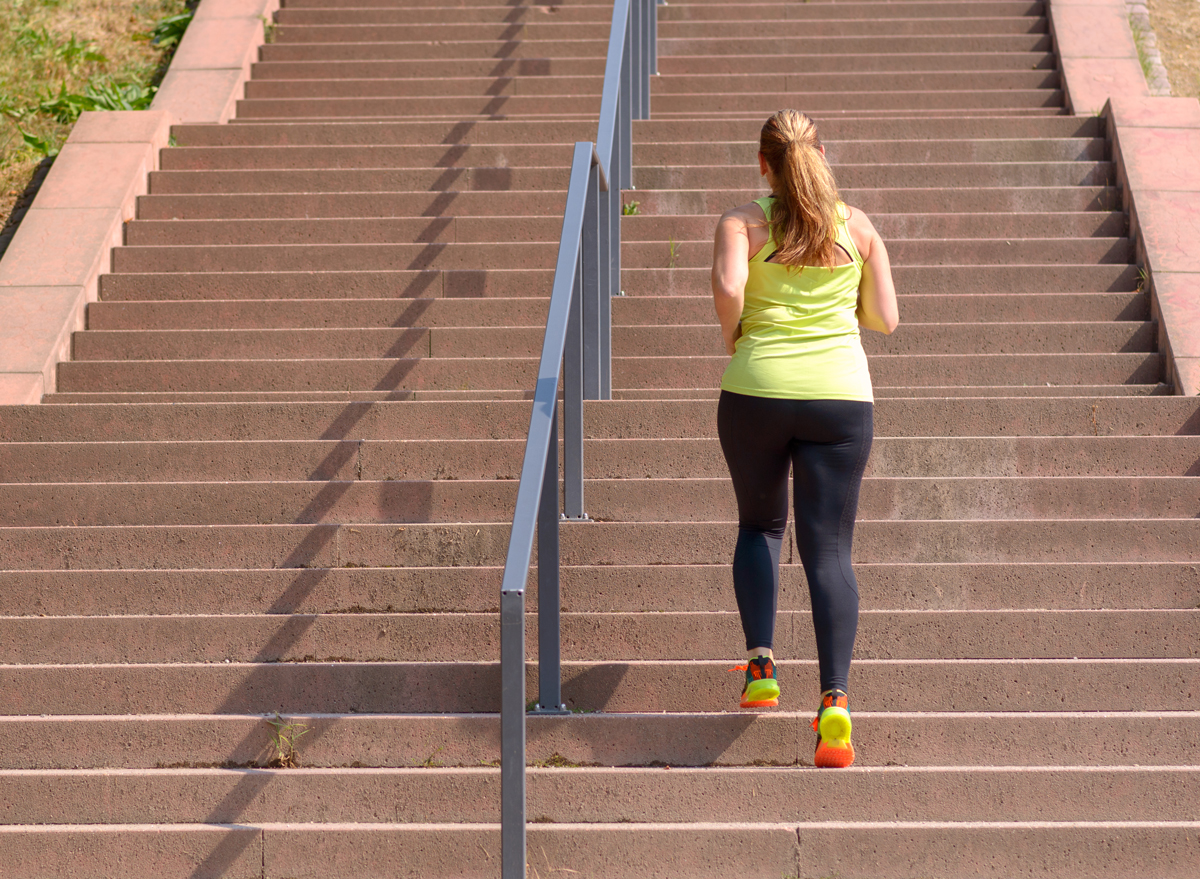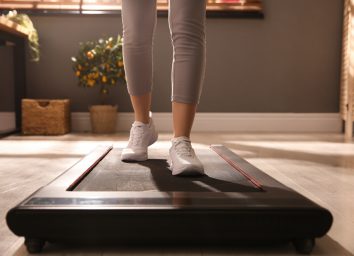This One Walking Exercise Can Predict Your Death Risk, Says Study

Doctors have long known that your ability to walk up stairs effectively is an excellent indicator of cardiovascular fitness and therefore longevity. In fact, many non-medical professionals know this, as well—especially fans of the 2003 Nancy Meyers romcom Something's Gotta Give, in which Jack Nicholson, an aging lothario in recovery from a heart attack, is told by his doctor that he is free to engage in intimate acts again once he is able to "climb a flight of stairs."
According to the top health experts—and a recently published study in the journal Risk Factors and Prevention—there's at least one handy exercise you can do at home to test your own fitness, heart health, and longevity, and all you need are two functioning legs and access to some stairs. Read on to learn how to do it, and for what it means for you. And for more on walking your way to a longer life, see here for The Secret Trick for Walking for Exercise, Says Harvard.
Why Walking Is So Closely Linked to Your Heart

If you're walking up stairs, it's simply a fact that it's quite difficult. Even professional athletes who bound up a couple of flights of stairs will feel momentarily gassed afterwards. In fitness terms, this is called "external intolerance," and it's what happens when your muscles are essentially cold and your heart rate is basically resting and then you all of a sudden do what is some pretty intense cardio. As your pump your legs up stairs, your heart-rate spikes suddenly, and your body instantly needs more oxygen. Do more of it while exercising, and your heart gets a killer workout.
"When exercising on an incline, your heart rate will be much higher than if you were working out on a level surface—your heart is working harder and becomes stronger," Satjit Bhusri, MD, a cardiologist at Upper East Side Cardiology, in New York, explained to Well+Good. "It's also a great way to lower your blood pressure, as your heart will strengthen over time to the point where it won't need to work as hard to pump blood throughout the body. Your lungs will also work much harder than if you were on a level surface, and will become stronger and more conditioned."
After all, this is why continuously walking up stairs—even slowly—can really cause you to sweat. For proof, see Why Experts Say This Viral Walking Workout Totally Works.
Measuring the "Stairs Test"

According to the aforementioned study, which was conducted by researchers at the European Society of Cardiology, the researchers assembled more than 160 patients who were either known to have—or were suspected to have—coronary artery disease (CAD). According to the CDC, CAD is the most common form of heart disease, caused by a buildup of plaque in your artery walls, and the symptoms include chest pain, weakness and nausea, "pain or discomfort in the arms or shoulder," and "shortness of breath."
Using a treadmill and utilizing the incline function, the scientists were able to gauge the participants' METs (metabolic equivalents), a metric that measures one's energy expense during certain tasks. For reference, one MET is the amount of oxygen consumed while sitting at rest and not exercising. (If you performed an activity that took you up to 5 METs, your body would be using five times the amount of energy you'd be using while watching Netflix.)
Getting your METs up is important for working out your heart and extending your life. If you can get your METs up higher, it's a sign of great cardiovascular health. "Previous studies have shown that 10 METs during an exercise test is linked with a low mortality rate (1% or less per year, or 10% in 10 years)," notes the study.
Once the participants were tested for their METs, they were then asked to do a single task: Climb four flights in 40 to 45 seconds.
Here's What the Scientists Discovered

The study participants who are able to successfully climb four flights of stairs in 45 seconds or less "achieved more than 9-10 METs," says the study. "In contrast, patients who took 1.5 minutes or longer to climb the stairs achieved less than 8 METs, which translates to a mortality rate of 2–4% per year, or 30% in 10 years."
In other words, if you can get to 9-10 METs, it's a better indicator that you'll live longer. And to gauge if you can get there, you need to be able to climb four flights of stairs in less than a minute.
How You Can Test it at Home

You can do exactly what the participants did: Attempt to climb four flights of stairs in 45 seconds. "The stairs test is an easy way to check your heart health," Jesús Peteiro, MD, a cardiologist at University Hospital A Coruña, Spain, said in the official release. "If it takes you more than one-and-a-half minutes to ascend four flights of stairs, your health is suboptimal, and it would be a good idea to consult a doctor."
However, some experts caution that it's not a perfect indicator, and there are always extenuating circumstances and other factors that may make it less effective. "It's a reasonably good approximation of cardiovascular fitness at one point in time," cardiologist Arnold Meshkov, MD explained to Well+Good, though he advises you to get a stress test at a hospital if you're really concerned about your heart and your body. And for more on walking for better health, make sure you're aware of The One Major Side Effect of Going on Single 1-Hour Walk, Say Experts.








